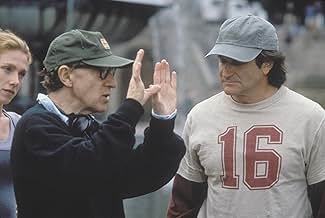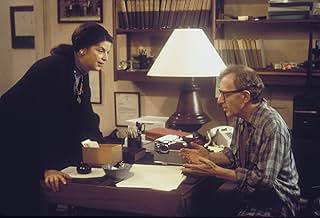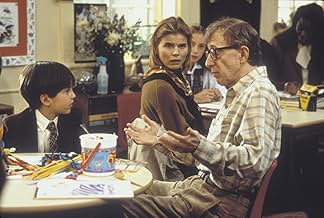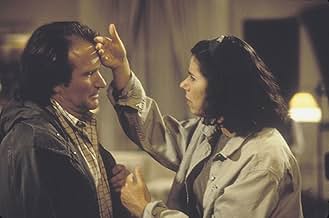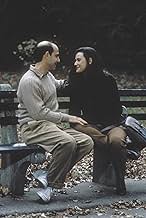Souffrant du syndrome de la page blanche et attendant avec impatience son prix d'écriture, Harry Block se souvient des événements de son passé et des scènes de ses livres à succès. Des perso... Tout lireSouffrant du syndrome de la page blanche et attendant avec impatience son prix d'écriture, Harry Block se souvient des événements de son passé et des scènes de ses livres à succès. Des personnages, réels et fictifs, reviennent le hanter.Souffrant du syndrome de la page blanche et attendant avec impatience son prix d'écriture, Harry Block se souvient des événements de son passé et des scènes de ses livres à succès. Des personnages, réels et fictifs, reviennent le hanter.
- Nommé pour 1 Oscar
- 4 victoires et 6 nominations au total
- Janet
- (as Stephanie Roth)
- Yankee Announcer
- (voix)
Avis à la une
In this film, Allen's alter ego is Harry Block, a writer in the mould of Philip Roth who, in the words of one his exes, turns everyone else's suffering into literary gold. And this assertion is corroborated by the opening scene, a section from one his books where a man and a woman who are having an affair, during a barbecue, decide to have sex in a bathroom while their spouses are eating in the garden. It's a very funny scene, especially as an attempted blow-job is interrupted by a false alarm (the woman grinds her teeth when the man spots his wife) and as some doggy-style sex is interrupted by the woman's blind grandmother coming into the room (when asked what's happening, the woman tells her grandmother that she's making Martinis while they continue banging away). But while the scene is absolutely hilarious, it does also have a point. This is a scene from Harry's life. He's using it in his work. Therefore his ex isn't too happy to find this episode in his book. Of course, Harry tries to explain that it was 'loosely based' (the grandmother was an embellishment), but that doesn't cut much ice with his ex, who's having all of the sordid details of her affair revealed to friends and family. So the film touches on ideas of a writer's responsibility. What's exploitation and what's inspiration?
One of the most revealing sections of the film is when Harry talks to his therapist. He discusses his attitude to women. "I'm always thinking of f****** every woman I meet I see a woman on a bus. I think what she looks like naked. Is it possible I might f*** her?" Essentially Harry is a man who has never grown up. He can't commit and he can't sustain a relationship with a woman, a fact backed up by his string of exes and his affection for prostitutes. Indeed, for him, whores are perfect. You don't have to woo them, they don't nag you and they do whatever you want; all you've got to do is pay them. And in the film, Harry takes Cookie, a black prostitute ("Do you know what a black hole is?" Harry asks her. "Yeah, that's how I make my living.") with him to an honouring ceremony at his old school.
Harry also takes a friend along with him and his young son well, he actually 'kidnaps' his son. And the whole journey, the whole act of going back to remember the past, brings back memories of stories he wrote, stories that are thinly veiled versions of actual events. One of the funniest is a story of a man who married his therapist. At first everything is great, the woman understands the man like no other woman in the world. But once they have a child she becomes "Jewish with a vengeance". No longer is she smart and funny and sexy; all of a sudden she's a dowdy nag who's rediscovered her religion. And in one hilarious moment she even prays before administering a blow-job. Again it's highly amusing, but again it has a point; Harry wants everything to remain perfect. He can't understand why people have to change. I mean, even having a child doesn't change him. He talks to his son about naming his penis. He may be getting on, but he's still really just a kid.
Harry's whole life philosophy is neatly summed up by his half-sister: "You have no values. With you it's all nihilism, cynicism, sarcasm and orgasm." To which Harry quips, "Hey, in France I could run for office with that slogan, and win!" But although Harry may be deemed to be juvenile, he's entirely correct about religion. He tells his devout sister that they're clubs and that their function is to exclude people. And then he asks her whether it bothers her more when a Jew gets killed or a gentile. She says a Jew death bothers her more "They're my people." "They're all our people," he replies. I'm with Harry. Religions are nothing but divisive. Plus they encourage people to prove how devout they are as if you can be more Jewish than someone else, or more Catholic etc. It all becomes a competition.
But amongst all this, the only thing that Harry can do to remain sane is to write. Somehow life doesn't make any sense but fiction does. I guess it's a problem most writers have. To able to write you have to observe, but the more you observe the less you understand why people behave the way they do. Plus the more you observe the more you actually remove yourself from life. However, self-examination does allow Harry to become more perceptive as regards himself. In fact, his characters help him out a lot, as they offer insights that he couldn't possibly come up with alone. So although the film's coarse, it ends up being quite optimistic. Salvation lies within.
Harry Block: "Six shrinks later, three wives down the line, and I still can't get my life together".
By its structure,"Deconstructing Harry" reminds the earlier film by one of Allen's favorite directors, Ingmar Bergman, "Wild Strawberries". As Professor Borg, Harry Block travels by car to upstate New York, where his college that expelled him as an undergraduate now wants to honor him as a world renowned belletrist. He travels by car with three unlikely companions, a hooker, a friend with bad heart, and his 9-years-old son whom he had kidnapped from school. As in "Wild Strawberries", Allen's film provides sincere, intelligent, and emotional contemplations of life's disappointment, regrets, and losses but at the same time, it is hilarious as only Allen's films can be. One of the best scenes of the film is Harry's descent on the elevator to air-conditioned Hell where in the ninth circle he meets the Devil who looks very much like Billy Crystal. Another wonderful scene concerns a married couple where after thirty years of happy uneventful marriage a wife learns some interesting eating habits from her husband's previous life. I can go on for long time. As often in the case of Allen's movies, with the modest running time of 96 minutes, "Deconstructing Harry" is expertly shot, boasts an amazing cast (Billy Crystal, Judy Davis, Bob Balaban, Elisabeth Shue, Demi Moore, Julia Louis-Dreyfus, Tobey Maguire, and Stanley Tucci just to name a few), and is in my opinion one of the most interesting and personal Allen's films.
The jerky jump-cuts might be a stylized editing cover-up for jumping from take to take to utilise the best performances of a pantheon of actors, or they might be planned...I don't know. I had to see a few of them before I settled into accepting them as "the style", but I decided they work in this film.
Other "user comments" complain about Woody and the sexy young women. That bothers me in some films, but not here. Here it's part of Harry's character--part of Woody's "character"--and is clearly part of his problem.
I think this is an honest film, a sad and revealing film about one of the most clever and creative writers in America. It's funny, it's witty, and it's also depressing. It has moments of pure, laugh-out-loud humour (eg. the elevator going down to the bottom floor of hell; Harry arriving at the honouring ceremony with a dead body, a prostitute, and his "kidnapped" son in the car), but underneath it's the story of a man who cannot function happily in real life, only in the fictions he creates. Although fantasy plays a major role in the story, the story is not a fantasy. The parallels between Allen himself and the character and plot he's created here are obvious.
I enjoyed watching this video, and would recommend it-- selectively--to friends. If you like the Allen sense of humour, want to see a fairly unusual editing style used effectively, want to see some superb acting cameos by some very talented actors, or have an interest in the torments of a neurotic middle-aged genius and how they might be revealed on film, then you'll like this movie. If this doesn't sound like your kind of thing, watch something else.
Deconstructing Harry is laugh-out-loud funny, tracing the steps of Harry Block, a neurotic, foul-mouthed, Jewish, self-hating, pill-popping, womanizing alcoholic (three wives and six therapists later) that oddly enough, resembles Woody Allen and his own life (give or take a few things). Block has (giggle) writer's block, and can't write about his life. As a result, he becomes `unfocused,' entangling himself in fact and fiction (i.e. he interacts with his own characters). `You expect the world to adjust to the distortion you've become,' Harry's analyst tells him. What follows is a series of skits that interact with the past and present and the real and imagined it's kind of like watching a Kurt Vonnegut story edited by Quentin Tarentino.
The all-star cast is phenomenal: Robin Williams is hilarious, Kirstie Alley is hysterically funny, Julia Louis-Dreyfus is super-sexy and Elizabeth Shue is as sweet as sugar. Billy Crystal even pulls off a good role as the Devil. But other than the characterization, Woody's new flick is witty, cold-hearted, extremely vulgar, often tasteless and perfectly profane with enough catch-lines to keep film buffs cracking for years (`I always keep a little hooker money around'). Hannah And Her Sisters this ain't!
Le saviez-vous
- AnecdotesAlbert Brooks was the last actor to be offered the role of Harry. In an interview with Playboy magazine, he stated that he received a nice letter from Woody Allen offering him the role. Brooks responded, "It was insane that Allen didn't do it himself." Apparently, Woody took his advice.
- GaffesIn Harry's line "I once almost ran over a book critic..." the word "book" doesn't match his lips; "book" is dubbed over what looks to be "film."
- Citations
Harry Block: Tradition is the illusion of permanence.
Doris: You have no values. Your whole life: it's nihilism, it's cynicism, it's sarcasm and orgasm.
Harry Block: You know, in France, I could run on that slogan and win.
Meilleurs choix
- How long is Deconstructing Harry?Alimenté par Alexa
Détails
- Date de sortie
- Pays d’origine
- Site officiel
- Langues
- Aussi connu sous le nom de
- Deconstructing Harry
- Lieux de tournage
- Sociétés de production
- Voir plus de crédits d'entreprise sur IMDbPro
Box-office
- Budget
- 20 000 000 $US (estimé)
- Montant brut aux États-Unis et au Canada
- 10 686 841 $US
- Week-end de sortie aux États-Unis et au Canada
- 356 476 $US
- 14 déc. 1997
- Montant brut mondial
- 10 686 841 $US
- Durée
- 1h 36min(96 min)
- Couleur
- Mixage
- Rapport de forme
- 1.85 : 1


